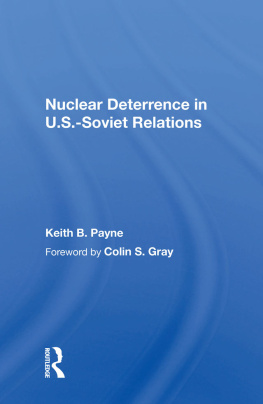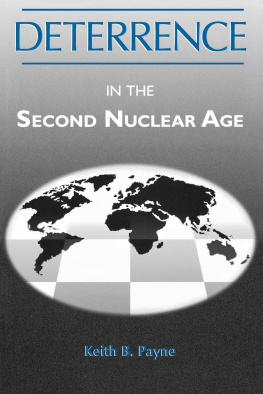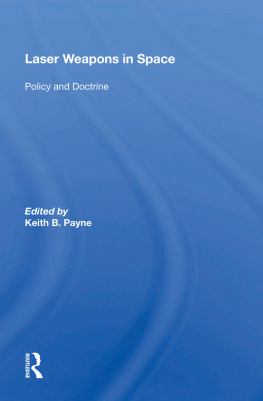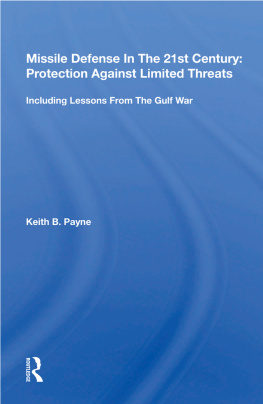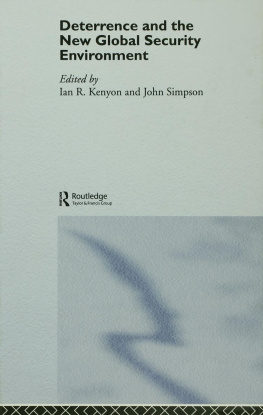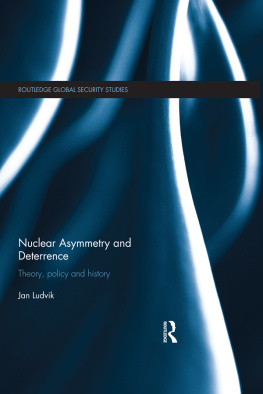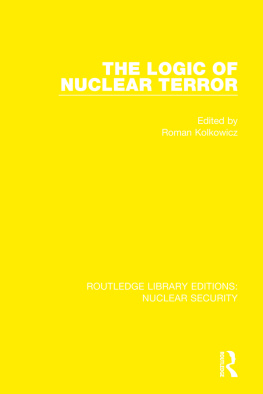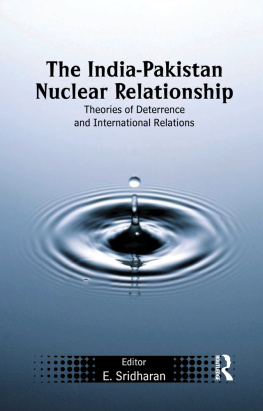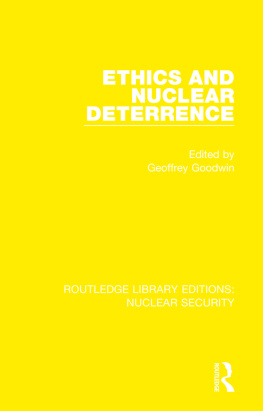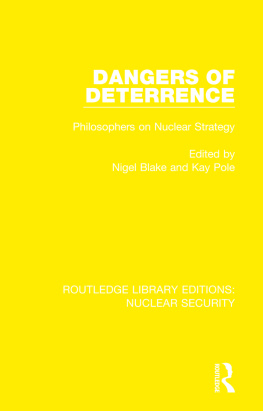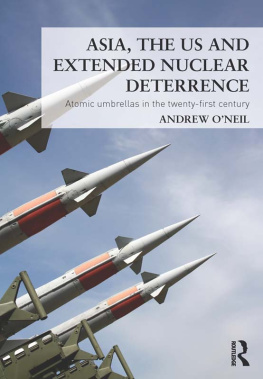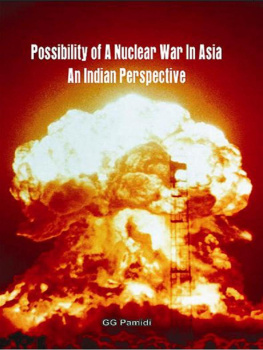Nuclear Deterrence in U.S.-Soviet Relations
A Westview Replica Edition
The concept of Westview Replica Editions is a response to the continuing crisis in academic and informational publishing. Library budgets for books have been severely curtailed. Ever larger portions of general library budgets are being diverted from the purchase of books and used for data banks, computers, micromedia, and other methods of information retrieval. Interlibrary loan structures further reduce the edition sizes required to satisfy the needs of the scholarly community. Economic pressures (particularly inflation and high interest rates) on the university presses and the few private scholarly publishing companies have severely limited the capacity of the industry to properly serve the academic and research communities. As a result, many manuscripts dealing with important subjects, often representing the highest level of scholarship, are no longer economically viable publishing projects--or, if accepted for publication, are typically subject to lead times ranging from one to three years.
Westview Replica Editions are our practical solution to the problem. We accept a manuscript in camera-ready form, typed according to our specifications, and move it immediately into the production process. As always, the selection criteria include the importance of the subject, the work's contribution to scholarship, and its insight, originality of thought, and excellence of exposition. The responsibility for editing and proofreading lies with the author or sponsoring institution. We prepare chapter headings and display pages, file for copyright, and obtain Library of Congress Cataloging in Publication Data. A detailed manual contains simple instructions for preparing the final typescript, and our editorial staff is always available to answer questions.
The end result is a book printed on acid-free paper and bound in sturdy library-quality soft covers. We manufacture these books ourselves using equipment that does not require a lengthy make-ready process and that allows us to publish first editions of 300 to 600 copies and to reprint even smaller quantities as needed. Thus, we can produce Replica Editions quickly and can keep even very specialized books in print as long as there is a demand for them.
About the Book and Author
Nuclear Deterrence in U.S.-Soviet Relations
Keith B. Payne
This book critically examines U.S. attempts to establish a nuclear deterrent against the Soviet Union and offers new approaches to dealing with the changing strategic environment. Dr. Payne maintains that the most influential theories of nuclear deterrence--Assured Vulnerability and Flexible Targetingare unrealistic, given Soviet foreign policy and attitudes toward nuclear war, and no longer adequately meet the requirements of U.S. national security. Identifying an approach compatible with U.S. security commitments, he argues that future U.S. policy should focus on defeating the "Soviet theory of victory"--on threatening Soviet military forces and domestic and external political control assets, while also defending the U.S. against nuclear attack. The discussion covers recent developments, among them the "new nuclear strategy" of the Carter administration and President Reagan's new weapons program.
Keith Payne is director of national security studies at the National Institute for Public Policy. Work on this book was conducted while he was serving at the Hudson Institute as a professional staff member, specializing in areas of U.S. and Soviet strategic defense policy, international security affairs, and Soviet foreign policy.
Nuclear Deterrence in U.S.-Soviet Relations
Keith B. Payne
Foreword by Colin S. Gray
First published 1982 by Westview Press, Inc.
Published 2018 by Routledge
52 Vanderbilt Avenue, New York, NY 10017
2 Park Square, Milton Park, Abingdon, Oxon OX14 4RN
Routledge is an imprint of the Taylor & Francis Group, an informa business
Copyright 1982 by Keith B. Payne
All rights reserved. No part of this book may be reprinted or reproduced or utilised in any form or by any electronic, mechanical, or other means, now known or hereafter invented, including photocopying and recording, or in any information storage or retrieval system, without permission in writing from the publishers.
Notice:
Product or corporate names may be trademarks or registered trademarks, and are used only for identification and explanation without intent to infringe.
Library of Congress Cataloging in Publication Data
Payne, Keith B.
Nuclear deterrence in U.S.-Soviet relations.
(A Westview replica edition)
Bibliography: p.
Includes index.
1. United States--Foreign relations--Soviet Union. 2. Soviet Union--Foreign relations--United States. 3. United States--Military policy. 4. Soviet Union--Military policy. 5. Deterrence (Strategy). I. Title. II. Title: Nuclear deterrence in US-Soviet relations.
E183.8.S65P39 327.73047 82-1970
ISBN 13: 978-0-367-02007-1 (hbk)
AACR2
To my Father and Mother, with gratitude
In terms of defense-intellectual history, Keith Payne's book merits landmark status. Dr. Payne offers a pitiless exposure of all aspects of "assured vulnerability" thinking. Much of the argument in this book has been presented, piecemeal, in articles and at conferences by critics of erstwhile "mainstream" theorists over the past several years, but this is by far the most rigorous and comprehensive critique of the direction taken in U.S. strategic thought and posture to be provided to date.
Although I happen to agree strongly with the book's pervading thesis--that "assured vulnerability" is a grossly inadequate and indeed dangerous strategic paradigm--I believe that this study should be of considerable educational benefit even to those who disagree with its premises or claims of logic. Although he states his case moderately and with due appreciation of the ubiquitous role of uncertainty, Dr. Payne's text does comprise, cumulatively, a very forceful indictment of a major (and indeed official) school of deterrence thinking, and can (and should) be read as a challenge for "assured vulnerability" proponents to "clean up their act." If one purchases a defense posture that, at the very high end of the scale of potential violence, cannot forcibly limit damage to the American homeland, how can such a posture be wielded for diplomatic effect in time of acute crisis?
As the author acknowledges, this book is designed as a contribution to the quality of strategic thought rather than as a manual for policy action. Readers of all shades of doctrinal persuasion should derive benefit from Dr. Payne's careful presentation of the Soviet strategic Weltanschauung . This book reminds us that deterrence is a Bilateral business and that the assessments that truly matter are those made in Moscow.
Particularly valuable is the vigor with which the author exposes the logical deficiencies of the various partial correctives which were applied to "assured vulnerability" thinking in the 1970s. While Dr. Payne sees value in strategic targeting flexibility, a la Schlesinger, and in "victory denial," a la Harold Brown, he explains with devastating clarity that strategic flexibility and a strategy worthy of the name are very different things. To summarize, he advances what I believe is the unanswerable point that the United States should not have an operational (as opposed, perhaps, to a declaratory) policy of being willing to initiate a very small nuclear war (via the exercise of SNOs-sub-SIOP nuclear options), unless it has a very persuasive theory for the successful conduct of a very large nuclear campaign.


